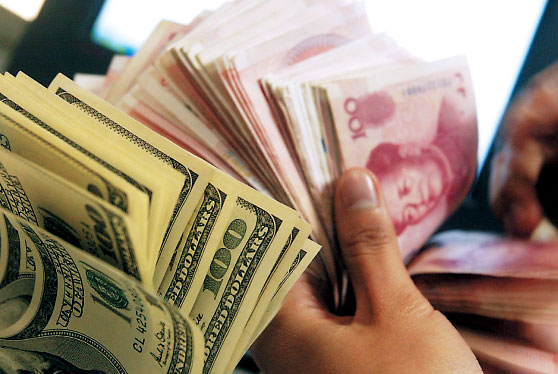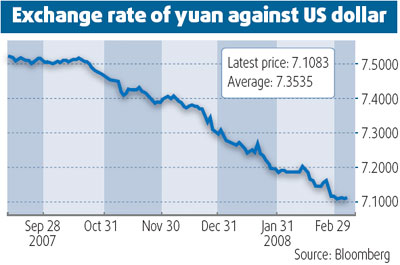


The Chinese Year of the Rat is believed to bring luck and fortune, but for many Chinese enterprises, especially exporters in the coastal regions, it has brought along uncertainty.
Many exporters may be facing closure as their operational costs rise while competition intensifies. "The yuan's appreciation, along with rising labor and materials costs, is squeezing us dry," says Wang Fu, general manager of Shenzhen Jiayinking Electronics, a 200-staff exporter of hi-fi systems to Europe, Japan and Africa.
In the Pearl River Delta, tens of thousands of export-oriented manufacturers may have to close their businesses or move them to places with lower operational costs, such as Vietnam.
The woes of these enterprises reflect the general problems in the wider economy, which is facing challenges on several fronts this year: yuan appreciation, uncertain foreign demand, rising inflation risks and unflagging oil prices.
Policymakers are standing at the crossroads: should they continue tightening policies or loosen up a bit in the face of a US-led global economic slowdown? Either way, China's economic growth is set to ease this year - although opinions differ to what extent.
Major international institutions, such as the International Monetary Fund (IMF) and the World Bank, have scaled down their forecast of the country's GDP growth this year to around 10 percent or lower from last year's 11.4 percent. Analysts said the consumer price index is expected to increase faster than last year and exceed the 4.8 percent target set by the government this year. Some even warn that China is in an upward inflation cycle, with high inflation likely to continue for some years.
Yuan threat
The yuan appreciation may accelerate this year, many economists have warned, forecasting that it will rise to about 6.6 to 6.8 against the dollar. In the one-year non-deliverable forwards market, the exchange rate of yuan is around 6.47, indicating a much stronger revaluation expectation.
The pace of yuan appreciation in the first two months of this year has surprised many. Its central parity rate is hovering around 7.1 against the dollar, rising more than 2 percent so far this year. If the momentum continues, it will appreciate much faster this year.
"Although the yuan appreciated by nearly 7 percent against the dollar last year, it has in reality depreciated against the euro, which means the revaluation pace could pick up this year," says Wei Weixian, an economist with the University of International Business and Economics.
Many economists warn that too fast an appreciation would hurt the economy, making things way more difficult for exporters. Yang Fan, senior economist with the China University of Science and Law, warns that in the longer term, if the yuan crosses 6 to the dollar, it will deal a "dangerous" blow to the Chinese economy.
"A sharp increase in yuan's value will have a great impact on foreign trade," says Lian Ping, chief economist of the Bank of Communications. "It will endanger many export-oriented sectors, so it'll be best for the yuan to appreciate gradually."
Last year, China's trade surplus hit $262.2 billion, up 47 percent from 2006. "But in the fourth quarter, the growth rate slowed down sharply," says Xu Xianchun, deputy head of the National Bureau of Statistics (NBS). As foreign demand is expected to decline this year as a result of the global slowdown, the growth rate could drop even further, Xu says.
The authorities have reaffirmed that they will continue to tighten the monetary policy this year. As the US Federal Reserve has cut interest rates and hinted at further reductions if necessary, the policy option for China to raise interest rates has been substantially constricted.
Economists say the country may still raise the rates two or three times this year to cushion against rising inflation, which hit 7.1 percent in January, and ask commercial banks to keep more money in reserve. Moves like these will mop up the excess liquidity swirling in the market and raise the cost of capital for enterprises.
International oil prices are also expected to increase domestic enterprises' costs of operation. According to a previous Asian Development Bank estimate, every $20 rise in crude prices will shave off about 1 percentage point from China's economic growth. The bank's assistant chief economist Frank Harrigan says that when international crude prices rose from $68 to $85, the Chinese economy slowed down by about 0.9 percentage point.
Another uncertainty stems from the new labor contract law, which took effect from January 1. The law, which aims to better protect labor interests and smooth labor-capital relations, ensures employers pay for overtime work and buy labor-related insurances for employees or sign formal contracts with them. It stipulates that employees who have worked for more than 10 years will be entitled to open-ended contracts. To save costs, many small companies do not provide such benefits to employees.
"The law may not push up inflation, but will probably affect employment and profit levels of enterprises," say Ha Jiming and Xu Jian, economists from the China International Capital Corp.
In recent years, shortage of labor has pushed up labor costs by 10-15 percent in Zhejiang and Jiangsu provinces, they say. The new law may add another 10-20 percent to staff salaries. Small and medium-sized enterprises in labor-intensive sectors are more likely to be hit harder, they say.
The legislation has come at an "unfortunate" time, according to Chen Xingdong, chief economist of BNP Paribas Peregrine Securities in Beijing. Chen says the economy may be entering a declining cycle this year, which will drag down enterprises. "People are no longer that confident in the economy."
The Chinese economy has galloped at a double-digit rate for five consecutive years since 2003. Based on previous experience during the 1992-96 period, when the Chinese economy also achieved five-year, double-digit growth, the peak occurred in 1996 before the economy started to edge down, says Xu Xianchun of NBS. "It is reasonable to believe that last year is the peak of this round of strong growth as well."
Silver lining

While most economists warn the possible global economic slowdown will deal a heavy blow to the Chinese economy, some are not that pessimistic. As the US economy slows down and American consumers become reluctant to spend, they are more likely to shift to cheaper Chinese products, they say, which will boost Chinese exports.
Domestic consumption would provide an anchor for stable economic growth this year, says Dong Yuping, economist with the Institute of Finance and Banking at the Chinese Academy of Social Sciences.
China's annualized retail sales increased 16.8 percent last year, the fastest since 1997. Consumption for the first time contributed more than investment to GDP growth.
"China's consumption structure is updating, with more high-end products becoming popular," Dong says. "The momentum of consumption growth is fairly good and in the next five or 10 years, may continue to outpace investment in contribution to GDP growth."
The impact of the international economic turbulence also may not be that severe, say some analysts.
"The global economy is becoming more closely interconnected, and the US, Europe and Japan may join forces to combat recession," says Dong. "This may prove effective."
On the other hand, the US accounts for less than 20 percent of China's exports, thus the impact of US slowdown on Chinese economy may not be huge, says Fan Gang, member of the monetary policy committee of the central bank. "If the Asian economy and the oil-exporting economies - which account for about 50 percent of China's foreign demand - perform well, China's overall foreign demand would not change much."
Moreover, the Chinese economy is still in the industrialization and urbanization cycle, which provides strong growth incentives, says Dong. Further modernization will require major infrastructure and other development projects, such as the 200 billion yuan Beijing-Shanghai high-speed railway. Projects such as these will create heavy investment, says Dong, keeping the economy on the tracks.
(China Daily 03/10/2008 page1)













